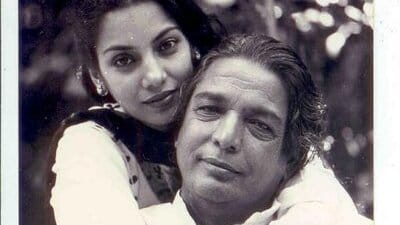New Delhi: From ‘Waqt Ne Kiya Kya Haseen Sitam‘ (Kaagaz ke Phool, 1959) to ‘Tum Itna Jo Muskura Rahe Ho‘ (Arth, 1983), Kaifi Azmi’s words were less poetry, more raw human emotion.
The celebrated poet-lyricist, who passed away 10 May 2002, gave Bollywood some of its most stunning classics, tapping his Urdu prowess to celebrate emotions as diverse as romantic love and patriotism.
Born Athar Husain Rizvi on 14 January 1919 in Mijwan, near Azamgarh, present-day UP, to a zamindar family, Azmi wrote his first ghazal when he was 11 years old. It was called ‘Itna To Zindagi Mein Kisi Ki Khalal Pade‘, and was later sung by legendary ghazal singer Begum Akhtar.
The first time he wrote lyrics for a song was in 1952, for a movie called Buzdil, directed by Shaheed Lateef (writer Ismat Chughtai’s husband), though it is Guru Dutt’s Kaagaz Ke Phool that is considered his big break. He went on to write lyrics for movies such as Shola Aur Shabnam, Anupama, Aakhri Khat, Haqeeqat, Hanste Zakhm and Arth.
Also a dialogue and screenplay writer (for one film), Azmi made history when he wrote the dialogues for Chetan Anand’s Heer Ranjha (1970) entirely in verse.
In 1975, he won the National Award and Filmfare Award for screenplay and dialogues in M.S. Sathyu’s Garm Hava.
In the last 20 years of his life, he returned to his home in Mijwan and transformed it to a model village. In recognition of his efforts, the UP government named the road leading to Mijwan, as well as the Sultanpur-Phulpur highway after him. A train from Delhi to Azamgarh is also named after him, the Kaifiyaat Express.
He was married to actor Shaukat Azmi and had two children, actor Shabana Azmi and cinematographer Baba Azmi.
On his 17th death anniversary, ThePrint talks to Shabana Azmi, who starred in one of her father’s most poignant lyrical achievements, Arth.
Kaifi, the revolutionary
An interesting story about my father: He was always different. His mother used to recall that, in spite of being born to a zamindar family in the village of Mijwan in Eastern UP, Athar (he took on the pseudonym Kaifi much later) would refuse to wear new clothes on Eid because the kisan’s children who tilled their land could not afford to do so.
His father Fateh Hussain was very fond of Urdu poetry and his two elder brothers also wrote poetry. At the tender age of eleven, Athar wrote his first ghazal:
“Itna to zindagi mein kisi ki khalal pade
Hansne sey ho sukoon na roney sey kal pade
Jis tarah hans raha hoon main pii pii ke ashk-e-gham
Yun doosra hanse to kaleja nikal pade”
He was sent to the Sultanul Madaris in Lucknow for religious learning. Within weeks, he formed a union and rallied the students to go on strike against the institution. He was thrown out.
From there, he went on to Kanpur and started working with factory workers, took on the pseudonym Kaifi, and began writing revolutionary poetry. This caught the attention of Communist leader Sajjad Zaheer, and he was invited to Bombay to write for the paper Qaumi Jung. He joined the Communist Party formally and found the path on which he was to traverse the rest of his life.
Also read: Ismat Chughtai felt crushed under the weight of her greatest creation, Lihaaf
What Kaifi Azmi’s writing stood for
Kaifi Azmi joined the Communist Party at the age 19 and then moved to Bombay to write for the mouthpiece Qaumi Jung. He then joined the Progressive Writers Association in 1936 where he wrote about social justice, communal harmony, gender justice, and the plight of farmers. Along with other writers of the Progressive Writers Association, he believed in using writing as an instrument for social change.
During Partition there was an assault on the Urdu language. It was believed that if you studied Urdu, you would not get a job. It is the writers of the Progressive Writers Association who brought Urdu in the form of Hindustani to the Hindi film industry through their lyrics and writings. Unfortunately, this tradition is fast dwindling.
He was a romantic while being a revolutionary at the same time.
How relevant is Kaifi Azmi today
He is extremely relevant today. He wrote about farmer suicides and their rights, about women’s rights and communal harmony — all issues we are dealing with today. He wrote a poem, ‘Doosra Banwas (the second exile)’, which was on the Babri Masjid demolition, where he writes that on 6 December [1992], Lord Ram must have wondered from where so many demented ones had come into his home. Kaifi argued that the demolition of the Babri Masjid was a blot on Ram’s legacy.
He practised what he preached and eventually returned to his home village of Mijwan to work for the people and set up the NGO Mijwan Welfare Society, which worked with women and farmers.
Kaifi Azmi, the father
The equation I shared with him was an extremely beautiful one. He was everything to me. My friend, guru and confidant. He had a great sense of humour, which very few people knew about.
He also taught me the two most important life lessons. When he was trying to bring about a change in Mijwan, he was still being criticised regarding many things. I went up to him and asked whether he felt frustrated that despite trying to bring about change, things were not going according to his plans and he had to face so many hurdles. He replied that if one was working for change, then they should expect the possibility that it won’t happen in their lifetime.
The second (lesson) is that if one works hard with sincerity and dedication that change will come about.
And that change has come about in Mijwan. There is a mindset change from the patriarchal notions of society.
Also read: Remembering Guru Dutt, the genius filmmaker






